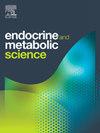Monosodium glutamate (MSG) exposure induced oxidative stress and disrupted testicular hormonal regulation, exacerbating reproductive dysfunction in male WISTAR rats
Q3 Medicine
引用次数: 0
Abstract
Background
Monosodium glutamate (MSG) is a common food additive linked to various health concerns, including potential reproductive toxicity.
Objective
To investigate the effects of chronic, low-dose MSG on testicular hormones and oxidative stress biomarkers in adult male Wistar rats.
Methods
Thirty male Wistar rats were divided into five groups (n = 6 per group). The control group received distilled water, while the experimental groups were orally administered MSG at 30, 100, 300, and 1000 mg/kg body weight for 65 days. Hormonal levels of luteinizing hormone (LH), follicle-stimulating hormone (FSH), and testosterone were measured using ELISA. Testicular oxidative stress markers, including malondialdehyde (MDA), glutathione (GSH), superoxide dismutase (SOD), catalase (CAT), and glutathione peroxidase (GPx), were assessed.
Results
MSG caused a dose-dependent decrease in LH, FSH, and testosterone levels, with the highest dose (1000 mg/kg) exhibiting the most significant reductions. MDA levels increased proportionally with MSG dosage, indicating heightened oxidative stress. Conversely, the activities of antioxidant enzymes (SOD, CAT, GSH, GPx) were significantly diminished, reflecting impaired antioxidant defences.
Conclusion
Chronic MSG exposure disrupts hormonal regulation and induces oxidative stress in a dose-dependent manner, potentially impairing male reproductive health. These findings underscore the need for further studies on the long-term reproductive effects of MSG and possible protective interventions.
味精暴露诱导氧化应激和睾丸激素调节紊乱,加剧雄性WISTAR大鼠的生殖功能障碍
味精(MSG)是一种常见的食品添加剂,与各种健康问题有关,包括潜在的生殖毒性。目的探讨慢性低剂量味精对成年雄性Wistar大鼠睾丸激素及氧化应激生物标志物的影响。方法雄性Wistar大鼠30只,随机分为5组,每组6只。对照组饲喂蒸馏水,试验组分别按30、100、300、1000 mg/kg体重口服味精,连续65 d。采用ELISA法测定促黄体生成素(LH)、促卵泡激素(FSH)、睾酮水平。评估睾丸氧化应激标志物,包括丙二醛(MDA)、谷胱甘肽(GSH)、超氧化物歧化酶(SOD)、过氧化氢酶(CAT)和谷胱甘肽过氧化物酶(GPx)。结果smsg引起LH、FSH和睾酮水平呈剂量依赖性降低,最高剂量(1000 mg/kg)降低最显著。丙二醛水平随味精剂量成比例增加,表明氧化应激升高。相反,抗氧化酶(SOD、CAT、GSH、GPx)活性显著降低,反映出抗氧化防御能力受损。结论慢性味精暴露破坏激素调节,诱导氧化应激,并呈剂量依赖性,可能损害男性生殖健康。这些发现强调需要进一步研究味精的长期生殖影响和可能的保护性干预措施。
本文章由计算机程序翻译,如有差异,请以英文原文为准。
求助全文
约1分钟内获得全文
求助全文
来源期刊

Endocrine and Metabolic Science
Medicine-Endocrinology, Diabetes and Metabolism
CiteScore
2.80
自引率
0.00%
发文量
4
审稿时长
84 days
 求助内容:
求助内容: 应助结果提醒方式:
应助结果提醒方式:


